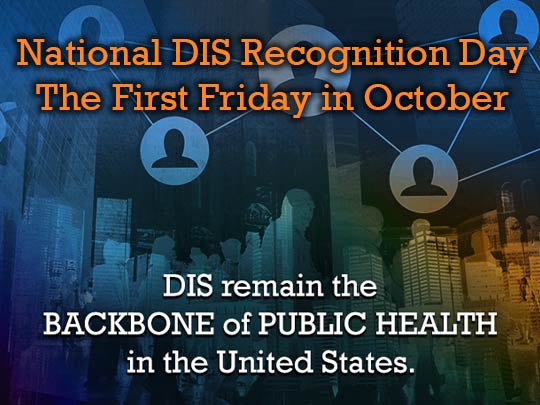A Salute at National Disease Intervention Specialists Recognition Day 2020

Cross-posted from Centers for Disease Control and Prevention (PDF, 199KB)
October 2, 2020
Dear Colleagues:
We are proud to recognize the ninth annual National Disease Intervention Specialists (DIS) Recognition Day. This year has been an unparalleled test of the nation and proven, once again, the invaluable role DIS play in our public health workforce. DIS are committed to working on the frontlines, fighting increases in sexually transmitted diseases (STDs) and tuberculosis, helping end the HIV epidemic, and supporting our national response (PDF, 826KB) to emerging health threats, such as the Coronavirus Disease 2019 (COVID-19) pandemic. Their work is all too often overlooked, and it is our pleasure to honor them today.
More than 2,200 local, state, and federal DIS perform one of the most essential pieces of our nation’s defense against communicable diseases – boots-on-the-ground contact tracing. They have long provided this support to stop infectious disease outbreaks, particularly STDs. But, this year, those efforts came into the spotlight. A recent surveyExit Disclaimer (PDF, 410KB) by the National Coalition of STD Directors showed that many STD/HIV DIS are conducting COVID-19 case investigation and contact tracing. Armed with a mask and a deep commitment to protecting the lives of Americans, DIS met people at their doorsteps, at community testing events and, when all else failed, reached them by phone and text message. Seasoned DIS have shared their expertise with the next generation of case investigators and contact tracers, who will come on board in the coming weeks and months to support the nation’s COVID-19 response.
While COVID has undoubtedly shifted priorities and resources, our work to prevent other infectious diseases has not stopped. For example, our Ending the HIV Epidemic efforts continue, and DIS are needed more than ever as patient navigators and network builders to see that patients are linked to care. They are a critical component of the public health infrastructure connecting patients, public health, and private health care providers. These expanding roles are in addition to traditional DIS roles of notifying people of their HIV or STD status and identifying people at risk for these diseases.
The demand for this type of expertise has increased exponentially with the additional COVID-19 workload, but our DIS have risen to the challenge and we are so proud of the work they are doing.
We respect and support the unwavering dedication of DIS to improve the nation’s health. We could not achieve national goals without them for COVID-19, and the other areas, including STDs, HIV, and TB prevention and control, where their work is critical. We would like to say to all our DIS, thank you for their commitment, flexibility, and can-do attitude during this unprecedented pandemic and every day.
Sincerely,
Robert R. Redfield, MD
Director, CDC